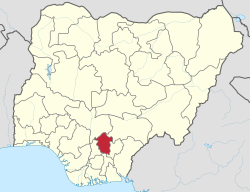
Back Enugu (Agan̄-mkpulu) ANN ولاية إينوغو Arabic Enuqu ştatı AZ انوقو ایالتی AZB Енугу (щат) Bulgarian Estat d'Enugu Catalan Enugu (kapital sa estado sa Nigyeriya) CEB Enugu (delstat) Danish Enugu (Bundesstaat) German Ŝtato Enugu EO
Enugu State | |
|---|---|
| Enugu or Enụgwụ (igbọ) | |
| Nicknames: | |
 Location of Enugu in Nigeria | |
| Coordinates: 6°30′N 7°30′E / 6.500°N 7.500°E | |
| Country | |
| Date created | 27 August 1991 |
| Capital | Enugu |
| Government | |
| • Body | Government of Enugu State |
| • Governor | Peter Mbah (PDP) |
| • Deputy Governor | Ifeanyi Ossai (PDP) |
| • Legislature | Enugu State House of Assembly |
| • Senators | E: Kelvin Chukwu (LP) N: Okechukwu Ezea (LP) W: Osita Ngwu (PDP) |
| • Representatives | List |
| Area | |
• Total | 13,161 km2 (5,081 sq mi) |
| • Rank | 29 of 36 |
| Population (2022 census.
Source: National Population Commission of Nigeria (web), National Bureau of Statistics (web).)[2] | |
• Total | 4,690,100 |
| • Rank | 22 of 36 |
| GDP (PPP) | |
| • Year | 2021 |
| • Total | $9.35 billion[3] 34th of 36 |
| • Per capita | $1,802[3] 34th of 36 |
| Time zone | UTC+01 (WAT) |
| postal code | 400001 |
| 042 | +234 |
| ISO 3166 code | NG-EN |
| HDI (2022) | 0.667[4] medium · 7th of 37 |
| Language | Igbo English |
| Website | enugustate.gov.ng |
 | |
Enugu State (Igbo: Ȯra Enugu) verbally pronounced as "Enụgwụ" by the igbo indigenes is a state in the South-East geopolitical zone of Nigeria, bordered to the north by the states of Benue and Kogi, Ebonyi State to the east and southeast, Abia State to the south, and Anambra State to the west. The state takes its name from its capital and largest city, Enugu. The city acquired township status in 1917 and was called Enugwu-Ngwo. Due to the rapid expansion towards areas owned by other indigenous communities, it was renamed Enugu in 1928.
Of the 36 states, Enugu is the 29th largest in area and 22nd most populous with an estimated population of over 4.4 million as of 2016.[5][6] Geographically, the state is divided between the Niger Delta swamp forests in the far south and the drier Guinean forest–savanna mosaic with some savanna in the rest of the state. Other important geographical features are the Udi-Nsukka Plateau and Ekulu River, which flows through the city of Enugu.
Modern-day Enugu State has been inhabited for years by various ethnic groups, primarily the Igbo people with minorities of Idoma and Igala peoples in Etteh Uno, a community in Igbo Eze North Local Government Area. In the pre-colonial period, what is now Enugu State was a part of the medieval Kingdom of Nri and the Arochukwu-based Aro Confederacy before the latter was defeated in the early 1900s by British troops in the Anglo-Aro War. After the war, the British incorporated the area into the Southern Nigeria Protectorate, which was later merged into British Nigeria in 1914; after the merger, Enugu became a symbol of anti-colonial resistance after the 1949 massacre of striking coal miners[7] in the Iva Valley.[8]
After independence in 1960, the area of what is now Enugu was a part of the post-independence Eastern Region until May 1967 when the region was split and the area became part of the East Central State. Less than two months afterwards, the former Eastern Region attempted to secede in the three-year long Nigerian Civil War with what is now Enugu State as a part of the secessionist state of Biafra. The city of Enugu was named the Biafran capital until October 1967 when it was captured by federal forces; the rest of the state was hard-fought over but much of it fell by June 1968. At the war's end and the reunification of Nigeria, the East Central State was reformed until 1976 when Anambra State (including what is now Enugu) was formed by the Murtala Muhammed regime. Fifteen years afterwards, Anambra State was divided with the eastern part being broken off to form the new Enugu State; in 1996, part of Enugu State's east was removed to form a part of the new Ebonyi State.[9]
Economically, Enugu State is based around trading, manufacturing, mainly plastics (but recently, China opened a factory called Dongfeng), and services along with agriculture, mainly of yams, rice, cocoyam, oil palm, and cassava. A key minor industry was mining, especially of coal in the Udi Hills around the city of Enugu. Enugu State has the tenth highest Human Development Index in the country and is considered the heart of Igboland, the cultural region of ethnically Igbo areas.[10]
- ^ Williams, Lizzie (2008). Nigeria: The Bradt Travel Guide. Bradt Travel Guides. p. 196. ISBN 978-1-84162-239-2.
- ^ "Population by State and Sex" (PDF). population.gov.ng. Archived from the original (PDF) on 19 May 2011.
- ^ a b Okeowo, Gabriel; Fatoba, Iyanuoluwa, eds. (13 October 2022). "State of States 2022 Edition" (PDF). Budgit.org. BudgIT. Retrieved 7 March 2023.
- ^ "Sub-national HDI - Area Database - Global Data Lab". hdi.globaldatalab.org. Retrieved 13 September 2018.
- ^ State, Enugu (18 August 2015). "About Enugu state". Archived from the original on 20 October 2019. Retrieved 25 February 2022.
- ^ "Population 2006-2016". National Bureau of Statistics. Retrieved 22 December 2021.
- ^ Onyeakagbu, Adaobi (12 April 2022). "Ever heard about the massacred souls that haunt Iva Valley in Enugu?". Pulse ng. Retrieved 26 June 2022.
- ^ Agunbiade, Tayo. "Remembering Margaret Ekpo and the Enugu strike massacre". Al Jazeera. Retrieved 23 December 2021.
- ^ "This is how the 36 states were created". Pulse.ng. 24 October 2017. Retrieved 15 December 2021.
- ^ "Human Development Indices". Global Data Lab. Retrieved 15 December 2021.

